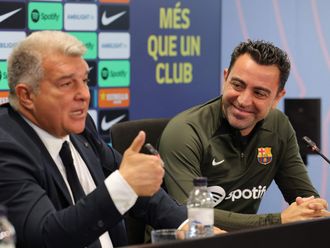Dubai: Japan boss Alberto Zaccheroni believes allowing young players to develop abroad is key if national teams in Asia are to improve.
The Italian coach has overseen a steady improvement in the Blue Samurai’s fortunes since he was appointed in September 2010 following their second-round exit at the Fifa World Cup in South Africa. Zaccheroni guided the team to Asian Cup success in Qatar last year and they are now on the brink of qualifying for the 2014 World Cup in Brazil.
The 59-year-old, who was speaking at the 7th Dubai International Sports Conference here on Saturday, thinks the fact there are now 28 Japanese plying their trade in Europe is of great benefit to his team. That approach is in contrast to many Gulf countries, such as the UAE, who saw their first ever player join a major European league in only January this year, when national team captain Hamdan Al Kamali moved to French side Lyon on loan, only for him to return to Al Wahda in the summer without making a first-team appearance.
“When I first joined Japan I tried to understand the problems, the mentality and cultural background of the players and try to see what I could work on,” Zaccheroni said. “I tried to look within the J-League and change the attitudes of all the players because I could count on only a few players. The J-League did very well because in Europe now we have 28 Japanese players.
“This allows the Japanese players to learn new experiences and to grow more. This is to the benefit of the national team. I believe a player will grow if he plays in one of the big championships.
“I do not know the situation here very well. If the attitude is not to let them go abroad and play, then everyone has his own priority. There are always pluses and minuses, but I believe the line followed by the Japanese players is a positive attitude.
“The domestic championship in Japan doesn’t really offer a lot and the young players who are playing in Europe are really growing, so although there are pluses and minuses, there are definitely more pluses than minuses in the short term — although in the long run, I don’t know.”










